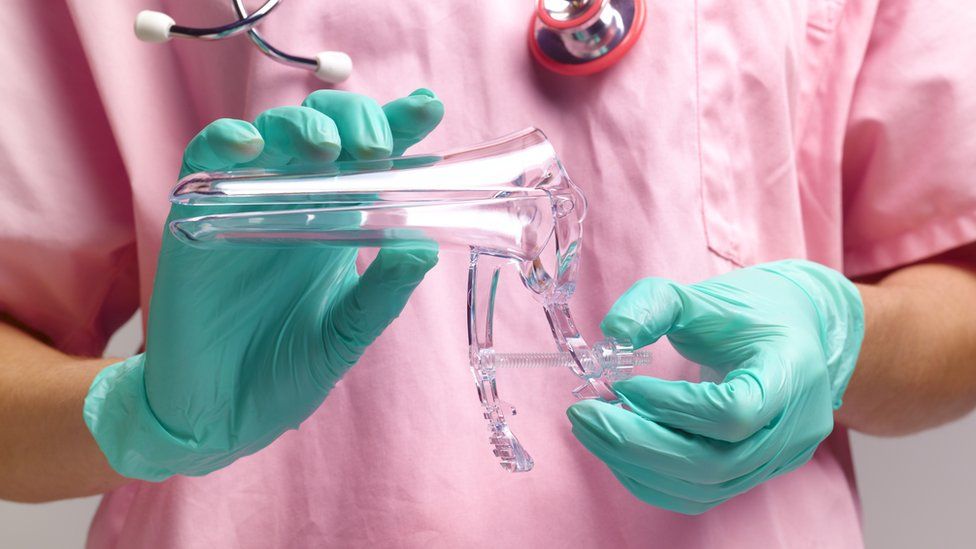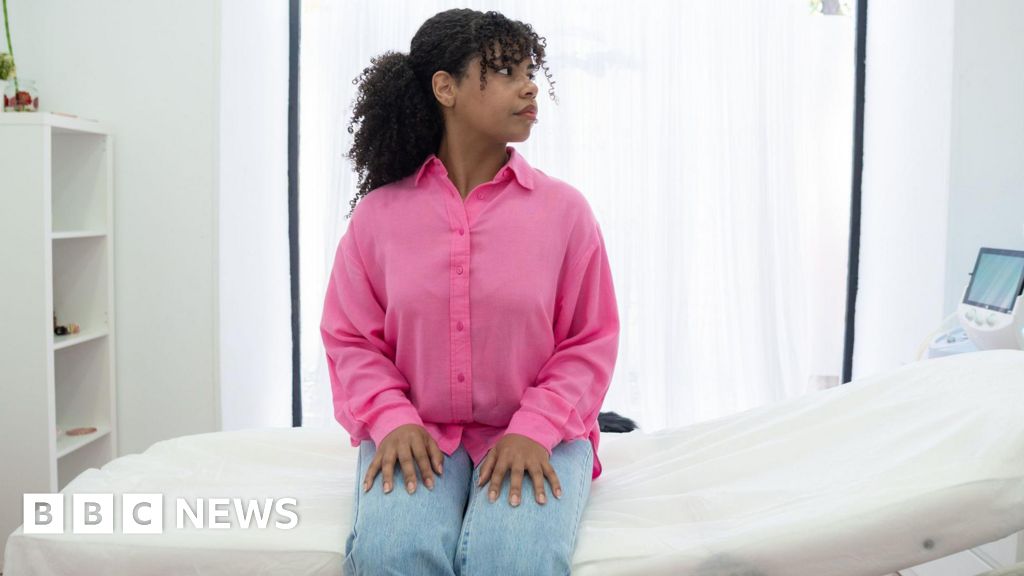ARTICLE AD BOX
 Image source, Getty Images
Image source, Getty Images
Smear tests check the health of the cervix
By Marie-Louise Connolly & Aileen Moynagh
BBC News NI
About 17,500 women in Northern Ireland are to have their smear tests re-checked as part of a major review of cervical screening dating back to 2008.
Some of these women will be recalled to have new smear tests carried out, BBC News NI can reveal.
The Southern Trust said that the women affected should receive letters by post from Tuesday.
It follows a highly critical report by the Royal College of Pathologists (PCPath).
- Several cytology staff were "significantly underperforming"
- Mechanisms to check their work were flawed
- Action taken by management was inadequate over many years
- While a majority of negative results issued by the laboratory were correct, a "significant number" of these would likely have been identified as "potentially abnormal" by other laboratories
While the Southern Trust says it is reviewing the cases of some 17,500 women, the RCPath report actually recommends that those women considered most at risk should be recalled so they can be reassured by a negative HPV test.
Broadly, these women are those who had a negative or inadequate result during the 13-year period of the review and have not had any tests since.
The Southern Trust did not follow up this recommendation as it does not currently have the resources to carry out repeated smear tests for these women as there is already a backlog across Northern Ireland.
BBC News NI also understands that the trust is in contact with the family of one woman who recently died from cervical cancer and another woman who is receiving palliative care.
The Department of Health called the report's findings "clearly unacceptable".
'Stress and anxiety'
Dr Steve Austin, the trust's medical director, has apologised for what has happened and for the "stress and anxiety" caused to women.
He told BBC News NI that there have been ongoing issues with underperforming screeners and that how it was managed "simply wasn't good enough".
A freephone helpline - 0800 9520255 - for those affected has been set up. It will be available Monday to Friday from 9.00-18.30 BST, and from 10.00-16:00 on Saturday and Sunday.
A woman who was diagnosed with cervical cancer has learned that she had three abnormal smear tests that were missed.
A woman who had to undergo a radical hysterectomy in the Southern Trust in 2019 because of screeners missing abnormal cells in three different smear tests said the latest development was "shocking and worrying".
While the Southern Trust has insisted only a few women may be impacted, they should not have been placed in this position in the first place, said the woman.
While last February she had been hesitant about speaking out, she was glad she did as lives may now be saved.
What is cervical screening?
Cervical screening can not detect cancer, but detecting and treating abnormal cells may help prevent cancer. No screening process is 100% accurate.
The screening looks for the human papillomavirus (HPV) which can cause abnormal cells on the cervix. If HPV is detected a cytology test is used to check for any abnormal cells.
Unlike the rest of the UK and Ireland, Northern Ireland does not have the primary HPV screening system in full operation.
In Northern Ireland, the cervical screening process involves two people - a screener and checker analysing slides under a microscope.
Whose smear test is being re-checked?
Tests taken in the Southern Trust between 1 January 2008 and October 2021 will be re-checked if they also meet the following criteria:
- The sample was reported or checked by one of a small number of screeners and a result of negative or inadequate was given
- This was the last satisfactory screening test result recorded for the woman (a subsequent smear provides assurance)
- The woman has not had a total hysterectomy
As screening is offered to women every three or five years, depending on their age, many women will have had more than one screening test during this timeframe and had subsequent smears which have provided assurance.
The trust says it also has to contact women who have moved out of Northern Ireland or are no longer registered with GPs.
Dr Austin says the trust was confident it had not missed anyone in the review.
What about the screeners?
Throughout the report, the screeners involved are identified by a number which has been redacted by the health trust.
The report highlights that the screener involved in the woman who spoke to the BBC's first test in 2011 was not meeting the required performance standards at that time.
It added that person "failed to achieve the 95% standard for high-grade sensitivity for four consecutive years between 2008 and 2012 and again during 2013-14 to 2014-15".
The Southern Trust has confirmed to BBC News NI that the same screener went on to work in another health trust but is currently no longer working in healthcare.
The report also found that another screener failed to achieve the standards required for five consecutive years from 2014 to 2019 and again from 2020 to 2021; another failed to meet standards for several years between 2014 and 2021.
Are any other trusts affected?
The Public Health Agency (PHA) said laboratories are all performing within required standards and "there are no similar concerns regarding other labs carrying out this work".
It said processes are in place to monitor this and quality assurance processes are kept under review.
The PHA added that while no screening programme could detect all abnormalities, Northern Ireland's screening programme was "very effective".
What happens next?
BBC News NI understands the review of slides is expected to start within the next couple of weeks but will take months, even longer, to complete if women are recalled for a repeat smear.
The Department of Health said that the findings of the report "are clearly unacceptable".
"The department is closely monitoring the actions being taken at trust and regional level in response to the RCPath recommendations," it added, in a statement.
It added that it was on course for full introduction of primary HPV testing by December 2023 which will mark the start of "a new era for cervical screening" and help to clear the current backlog for reporting smear test results.

 1 year ago
37
1 year ago
37








 English (US) ·
English (US) ·